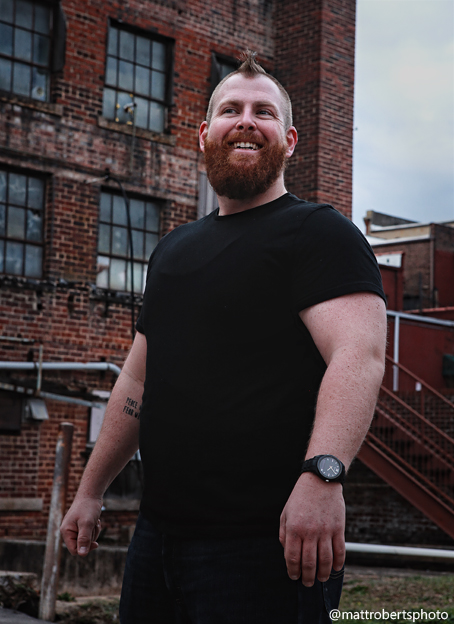
There is no better place to hide than in plain sight. Have you ever misplaced your glasses only to find out you were wearing them all along? Nope? Just my mum and dad then? Love you guys.
Moving on, I ask you, is there any more obvious place you can hide a depressed mind than in a crowd of people looking for laughter?
To answer that question I had the pleasure to talk to Jack, the film director of Reggie: A Millennial Depression Comedy, a movie about a young man who, on the outside, seems to have a great life, with a great job and friends, but who is very much depressed. Comedy is once more used, to have a conversation of serious issues that seem more easily dealt through laughter.
Jacques (Jack) Belliveau is a comedian, filmmaker, podcaster and producer by day and a motorcycle and tiny horses fan by night.
With more than 250 standup comedy showcases across the country, and over 50 episodes of a well-received podcast, it’s safe to say he has a way with funny words and scenarios. Even though he used the stage as a way to subliminally talk about the desires of a depressed person, it wasn’t until he created the movie, that he was able to publicly address the mood and anger issues that he could easily hide within his shows. As he states in his website “he has over 25 years of performance experience (acting, comedy, music, lying to people when they ask if he is ok)”.
He is here today to talk about his life, from what sad event prompted him to seek help and turn his mental health over (for the good), to how tiny horses and laughter positively impacted his life and the life of his audience. If you have the tendency to hide in plain sight, I give you Jack Belliveau story. Off we go.
Part I: Jaque’s work background and context (His story)
How did you first start talking about depression?
Honestly, I first started talking about depression as it related to other people in my life. I made myself a sounding board for their issues. A lot of times I would see the same symptoms they exhibited in myself that their counselor/therapist would explain to them were a product of one situation or another that had happened in their life. I guess in a way I “self-medicated” through them. By hearing and relating to their problems I found a small comfort in knowing I wasn’t alone, even if I would never admit to them or anyone that I was struggling. My most often used phrase then, and to a certain extent still now is/was “I’m fine” I wasn’t fine, and still most days, I’m not fine. As much as I hate labels, I can honestly say that then, and still now I’m a manipulator. I don’t mean that in the “I fuck with people’s heads” the over the top narcissist way, but I became an expert in turning every situation around to where people would talk about themselves and the focus would be off of me and my issues. At the end of the day, it’s human nature to want to talk about one’s self, even I yearn to do so. Then comes in the shame and embarrassment and the constant barrage of “I’m wasting their time by talking about my silly problems”.
It wasn’t until 2018, I was 32 years old, that I finally had the courage to seek professional help for my own depression and anxiety. I’m not sure I’d say I was at rock bottom, at least I’m sure that’s not how it appeared to an outsider considering I had been in some bad situations in my life from an abusive household to being arrested. In my head though, I was lower than all of that because I was trapped by me. I was in a situation where I had no outside force that I could lay the blame on for my state of being. I had a great day job, friends who loved me, my comedy was going great. I had the usual “struggling artist” issues, but this was something more. I often found myself paralyzed from depression I would lay on the floor of my apartment knowing I had so much to do, stuff that I loved and wanted to do, but unable to make myself do. I hated myself more and more with every passing second that I laid there. I had gone from laying on the couch in this paralysis to laying on the floor because I hated myself so much that a piece of shit like me didn’t even deserve a couch.
It was on an up day in early 2018 that I impulsively googled counselors near me and I picked one of the first ones that was near me but not in the same town and I booked an appointment without doing any research. If I didn’t do it right then, I wasn’t going to do it, like so many things throughout my life. That is how I first started telling another person about my own struggles, and even then it was all filtered and edited.
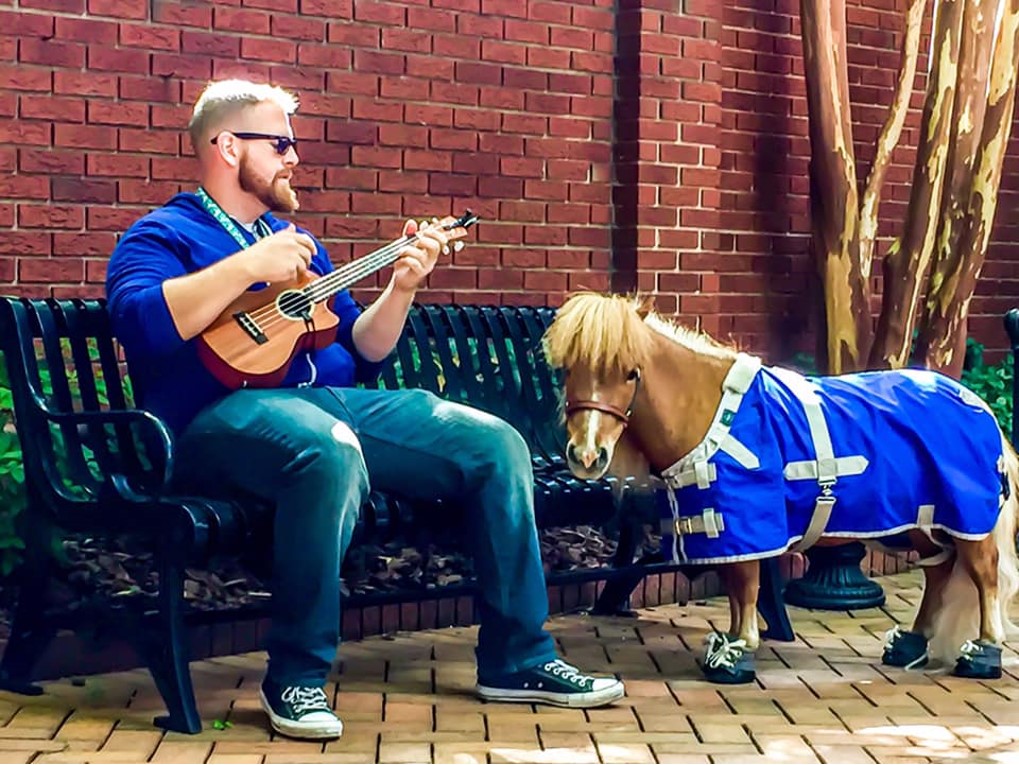
When did you start feeling this was something you wanted to explore as a professional project?
As a standup comedian, every joke I write/perform has a bit of realness in it, a nugget of truth that I want out there. I would often talk about things on stage like having a future family or owning a posse of ponies. I’ve never had a stable family, or a genuinely healthy relationship and I’ve never had a pet. SO through comedy I could kinda tell people what I yearned for, but it was all “a joke”
A few years ago, I wrote a set about how I thought it would be cool to have an army of miniature horses to trot around town and live on a giant mini horse farm. I went into how a miniature horse could be registered as a therapy animal. I would lay on stage and talk to the horse and then I’d get on all fours and talk as the horse in response, neighing and whinnying. It was ridiculous and silly.
Flash forward a couple of years, I’m still performing, I’ve started counseling and I’m in the gym listening to a playlist of new releases. The song “Where Would I B Without U” by hip hop artist Spose starts playing. From the first note, it ignited something in me, I’m not sure why. I mean, it’s an amazing song, heartfelt, musically it speaks right to me from the rapping to the saxophone, but it could have only been the combination of my mindset, my lowered guard from gym exhaustion and a multitude of other factors and stars aligning that could have given me that feeling. That night I went home, and I combined my comedy act, my life story and struggles and the feeling that that song had given me and I wrote “Reggie” entirely in one sitting. Up until then, I had never thought that I would be able to share a piece of me so raw with anyone. Honestly though, the idea of sharing it with potentially millions of people was a lot less scary than sharing any real part of my story with one person that was close to me.
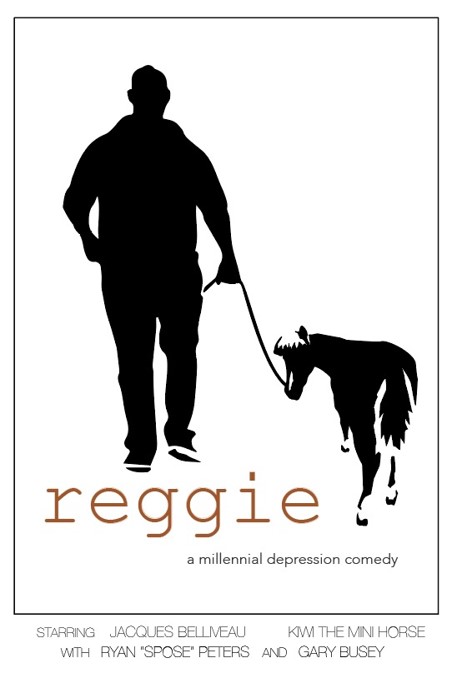
We love tiny horses!
How did the idea of a film and a podcast come about?
After I wrote the film and started production on it, I started having people comment to me from the cast and crew as well as from people outside of the process who had only just seen the details I had been posting online, comments about how this was really having a positive effect on them and how they could relate, how they felt seen for the first time.
I had had a comedy podcast years ago that I loved doing, and I missed it. I knew I wanted to get back into that world and I also wanted to relate to more people and to continue to help people if I could. Thus, was born “The millennial Depression comedy Podcast” an offshoot of the movie that dove into the real-life struggles of people. I attempt to connect with every interviewee, for us to be vulnerable with each other. It’s been hard for me. To open up to people I’ve known for 20+ years as well as strangers, but I can’t expect them to do it if I can’t, so I force it knowing it’s what’s best for me and the podcast. I’ve gotten so many positive reviews from the podcast, people who have been touched, and even saved after hearing it. Right now, it’s sporadic, I hope to make it more of a consistent show, but sometimes I can’t overcome that shame/anger/self-hatred/fear often enough to get it done, but I’m working on it.
What are you hoping to do with it?
With the film, I’m hoping to distribute it as widely as possible. I’m hoping to give people something to relate to, to make them not feel so alone. I want to help end the stigma over talking about mental health, to open a dialogue to where talking about depression is as ok as talking about how you broke your leg over the weekend. I want to help people not be so afraid, and I want people to know that the one size fits all method of mental health care isn’t necessarily the only solution. You have options.
Looking back, was there ever a moment, a conversation or an experience that you consider the reason why you chose to do this?
Like I said earlier, the reason the movie came to be was that moment with the song and the stars, planets, fates etc. aligning just right. Before that though, there was an experience that put me on the path of me taking my comedy more seriously and believing in it (as much as I’m able to) and on the path of becoming more self-aware.
4 years ago, I was performing in a sketch comedy show with my group, The Sloan, in Greensboro, NC. We were having a great show, the audience was loving us, and we were in our groove. It was the 2nd night of a festival that we were a part of. During one of my monologues, my phone began vibrating, over and over. Someone was really trying to get a hold of me. Not really thinking too much of it, I figured it would be funny to answer it on stage as a gag. On the other end was the aunt of one of my good friends, they had found her earlier, she had taken her own life. I could feel my face burning and my eyes watering as I hung up. Through anxiety and panic I continued with the show, I could feel myself shaking.
I hadn’t spoken to my friend for more than a few minutes here and there for about a month when I had seen them at my New Years’ eve Charity show that I put on. Life was busy, I was rehearsing and working. Every time my friend reached out to talk or wanted to hangout, I was dismissive, I was overwhelmed with my stuff. My friend never mentioned what they wanted to talk about, so I didn’t think much about it. Now though, I can’t help but think maybe I could have done something. This friend was one of my biggest supporters, always knew that I’d be on SNL one day.
I had never lost anyone that I was close to, never been to a funeral. I hated it, I hated the situation, I hated myself for failing at the one thing I thought I was decent at; being a friend, a listener. I still carry anger about this, more than I realize some days.
My friend never told me they were struggling; I had no idea at the time. Looking back, I can see the signs, the same signs I exhibit, the same tactics I apply for diversion and such from the real me. I hate the saying, but hindsight really is 20/20. I think that situation, as horrible as it was, saved my life. I hate myself for thinking that, but I know it’s true. None of what I’ve done with these projects would have gotten done had I not experienced this shitty situation.
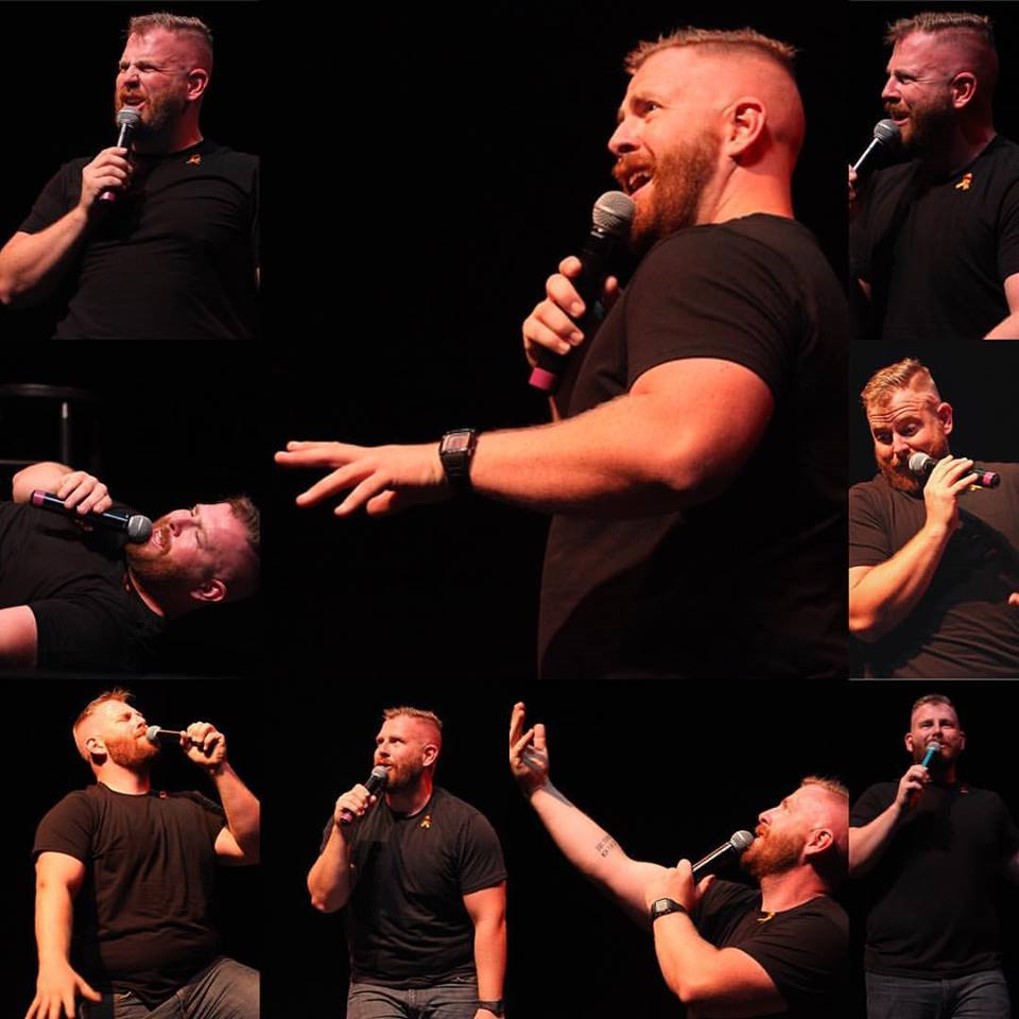
As you move forward in this path, how do you see yourself in the future?
Through counseling and eventually seeing a clinical psychiatrist, I was diagnosed with severe adult ADHID (attention deficit hyperactive impulsiveness disorder). To have a label (as much as I hate them) to put to one of my underlying issues has been an incredible weight lifted from me. I reluctantly started on medication that completely changed my life. I have accomplished more in these last 13 months since I started taking it than I had in the 5 years prior. I still struggle daily with depression, anxiety and a slew of other things, but treating that underlying issue has made it all seem way more manageable. Moving forward, I’m almost starting to believe that maybe I can make a go at this thing I love. Maybe I can make a difference to people with my storytelling and my humor. I can even see myself healing more, though it’s hard to imagine a time where I could ever do something like love myself or allow anyone to know the real me, I don’t even know that person. I do see myself trying in the future and learning from my mistakes though.
Part II: Depression
What do you think is the biggest misconception people have about anger as part of depression?
For me personally, it’s that they think I’m mad at them or the world or the situations I’m in. When in fact I’m incredibly angry at myself for not being able to properly communicate with them or the world or to properly handle or change my situation and world. When I can’t do those things, I get angrier and that anger makes handling all those things harder in an endless cycle. Even when I’m laughing, when I’m creating, when I’m enjoying my favorite coffee, when I’m orgasming, when I’m doing all of these “happy” things, I’m so angry at myself.
Was it the same for you?
I never realized that one was a part of the other. To me I was just always angry, and depressed people were just sad.
What do you think are some of the obstacles that millennial men face when dealing with depression?
I think the biggest obstacle (of many) is the trap between generations. The generation older than me (including media, tv, movies, music etc.) paint a picture of manhood and masculinity that is extremely toxic to society (men and women). The stoic, never crying, strong, handy hero comes to mind. Whereas the newer generation cries freely, texts with a therapist on the daily, posts on social media about how they’re sad and need a mental health day. It’s such an extreme in both directions; it’s hard to know what to do. I don’t think a man should conform to either of those things if that’s not how he truly feels, but I know that a lot of men are afraid of being seen in either camp.
What is the thing that you are most proud of when you look back and see how much you have grown when it comes to your mental health and dealing with depression?
I hate the “P” word. I feel “cringey” and uncomfortable when people say it to/about me and I don’t think I can remember ever feeling it about me. I am the most thankful that I’ve pushed past a lot of my fears though. The fear of talking, of letting people in (to a certain extent) and my fear of thinking I could never make an impact.
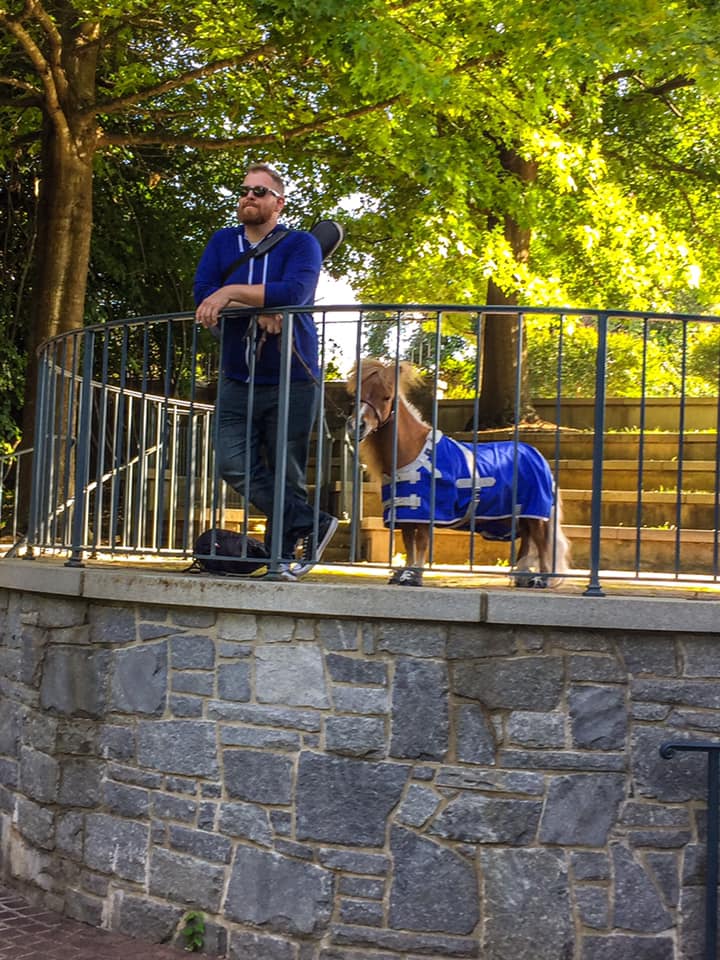
If someone has anger issues & depression and want to start doing something for themselves to change that, what would you recommend so to avoid those common mistakes that you mentioned before?
My one piece of advice is to start small. If you attempt to do a marathon the first time you ever run, you’re most likely going to fail. Little steps make big progress and the frustration from small failures is less detrimental than huge flops. You aren’t on anyone else’s timeline; you must heal at your own pace. Also, what works for me may not work for you. Sitting on a couch chatting may not help you, there are so many options. Some that work for me, besides traditional therapy are working out regularly, taking 30 minutes to yourself in the morning (preferably in the sun and trees) equine therapy (www.stampedeoflove.org) and writing.
The community around my movie and podcast @thereggiefilm on Instagram and Facebook and The Millennial Depression Comedy Podcast on Spotify, Apple Podcasts, Google Play, Podbean, and Stitcher are amazing and I welcome anyone to reach out if they ever need anyone to talk to. I’m not a counselor or a doctor, but I love helping when and where I can. Also, something that helps me tremendously is being of service to others, volunteering, donating your time or money to a cause that’s important to me. My go to is Prevent Child Abuse Rowan and the Terrie Hess House (https://www.preventchildabuserowan.org/)
Cool, to wrap it up, is there anything else that you would like to add?
As a 250lb powerlifting, motorcycle riding, Spartan racing, tattooed, bearded highland gamer, I can assure you that admitting that you’re struggling is not a weakness. Being honest with yourself takes more strength, and courage than anything else you can imagine. Anybody who says different is only saying it through a filter of their own insecurities and struggles. Be kind to them, and be kind to yourself.
Addendum
I hope that you all feel inspired to get your own little horse farm, I literally can’t wait! But seriously, in a world filled with easy ways to draw attention to you, I sincerely hope that you can find balance between pathologically hiding and pathologically showing yourself out. The most important thing about treating depression is to stabilize your mood son you can feel peace and happiness as a constant state of mind, not to hide it or to show it.
Jack’s story has many important points. I’m sure you will pick the ones more relevant to you. Here are my frame lessons and opinions as a psychologist and quite frankly just as a human being:
- You don’t have to have a shitty life for you to be depressed. In fact, the purest form of psychological depression, if there is such a thing, are those cases when people have everything going for themselves, great loving relationships, great job etc., and still feel a dark void sucking the life out of them. It’s easier to understand depression if a tragedy just happened, or if you don’t have a family, a loving partner or a job. Not to lessen that kind of mental pain, just to exemplify the misconceptions people have about depression. You can be depressed even when life is good.
- There is a biological way of being and a social one, most of the time the latter is derived from the former, and sometimes they get mixed together. With so much politicized information out there, it is no wonder why this generation of men feel confused and out of place. You do great things for your mental wellbeing when you learn to identify the differences between the two concepts. When the social way of being complements the biological one, you can have great things, however when it denies it, it causes different problems, from a lack of clarity as to how to be, to mental distress by trying to enforce a way of being that denies your evolution process. Once you know how your biology impacts your behavior and life choices, you can then integrate that part of you to your current way of being and your future decisions.
- Seeking help is not a matter of just bravery but of responsibility. Of course, it’s easier said than done, but as Dr. Jordan Peterson would say, treat yourself as you would treat someone you love.
When you feel the eyes of the world are looking and judging you, is then understandable why you wouldn’t feel like going to therapy. However, at the end of the day, if what you are going through was happening to someone else that was under your care, your way of reacting would be much different. So why would you show that level of common sense, care and responsibility for someone else and not you?
I could go on and on about the different elements of Jack’s story that are very much important, but I choose these because on the big picture I feel we went from denying mental illnesses to feeling almost proud of having one, like if it was an achievement or something you buy to look pretty. As Jack pointed out, both are extreme visions and do nothing for a man’s mental health or anybody for that matter.
I have nothing but respect for this talented guy! I hope you get to learn from his story so one day, someone could learn from yours.
To learn about his services, visit Jack at www.hafcafproductions.com .Follow him on Instagram and Facebook under Reggie: A Millenial Depression Comedy username, to get helpful content on depression and to keep up with his projects.
And, if you enjoy humor and great topics related to depression, do yourself a favor and join Jack’s podcast, Reggie: A Millennial Depression Comedy.
Alright! That’s a wrap for me. Until the next one!

